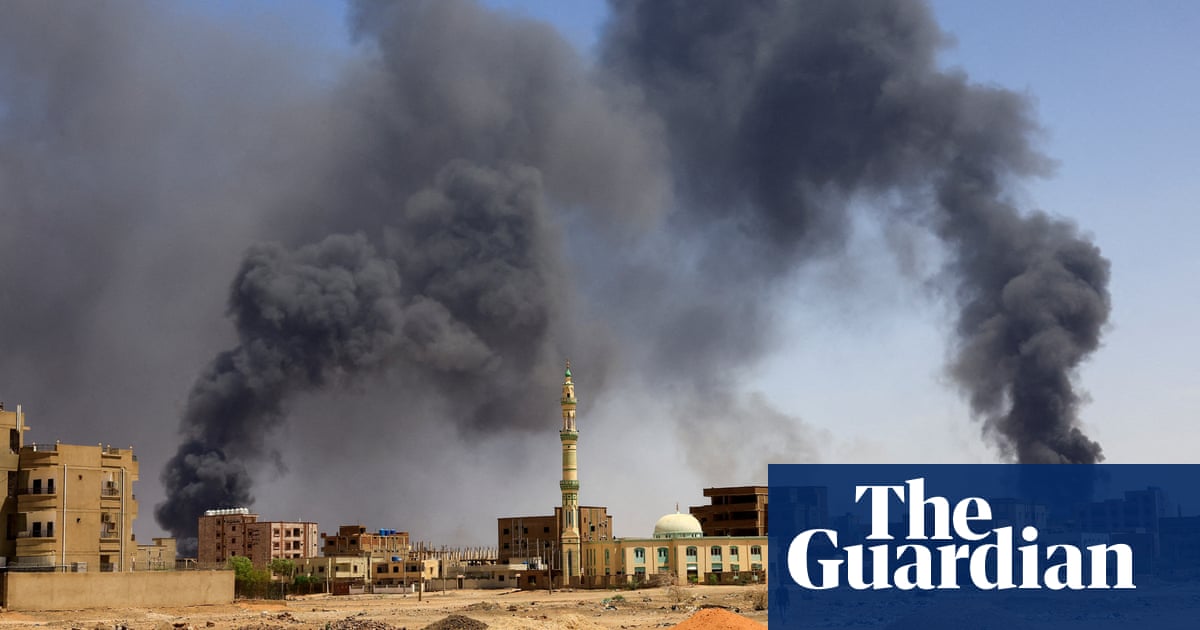
Fierce street fighting, including the use of heavy weaponry and artillery fire, has consumed centralKhartoum as worsening violence tests a deteriorating ceasefire.
Volleys of airstrikes and sounds of gunfire were audible in Khartoum’s twin city, Omdurman, overnight as clashes raged throughout the capital, and were particularly heavy in areas around major government and military infrastructure in the city centre.
Hospitals increasingly reported strikes on their premises, and an airstrike on the area outside East Nile hospital in north Khartoum killed at least three tea vendors as well as a child, leaving behind only a crater.
The Rapid Support Forces, a paramilitary group who have sought shelter in densely populated urban areas of the capital, blamed the Sudanese Armed Forces for violating the ceasefire with strikes on factories and medical facilities, including the East Nile hospital, where they said dozens of civilians were killed and injured.
The SAF, led by the country’s de-facto leader, Gen Abdel Fatah al-Burhan, claimed the RSF infiltrated the homes of soldiers and detained their families.
Both parties have said they are open to sending negotiators for talks in Saudi Arabia, with discussions limited initially to how to enforce a ceasefire amid fighting that has left more than 500 dead. The true number of casualties is unknown as most hospitals are unable to function fully, while a medical union described piles of bodies left in the streets as fighting continued around them.
Despite pressure to quell the violence as the two groups fought for control of the capital, civilians remained caught in the crossfire. There was little suggestion that either the SAF or the RSF would allow anyone representing the Sudanese populace to attend negotiations.
Ahmed Al-Mufti, a longtime human rights advocate based in Omdurman, said: “I think these negotiations will be difficult. But there needs to be a ceasefire as citizens are suffering so much, they need a permanent ceasefire to get life back to normal.”
Mufti said he believed any peace negotiations should build on discussions that took place before the fighting began, concerning the transfer of power to a civilian government. Burhan and his RSF rival, Gen Mohamed Hamdan Dagalo, known as Hemedti, have shown an unwillingness to transfer power to civilian elements in Sudan’s political system, including collaborating on an October 2021 military coup.
Mufti said: “The ceasefire should be discussed within the context of the political framework agreed before, and to build on what was previously agreed upon. Unless the discussion is based on what was agreed on before, and each party’s reservations – these were the reason for this conflict, that some political forces wanted to impose on the others, and it’s not democratic.”
As battles raged across the capital and the Darfur region, civil society increasingly stepped in to help people. A coalition of unions and civil society groups founded an umbrella group, the Civil Front to Stop the War and Restore Democracy, demanding an immediate end to the fighting, a return to the political process towards civilian rule, an end to military rule, and security sector overhaul.
Sudanese civil resistance committees – localised political groups integral to the 2019 uprising that ended the reign of the former dictator Omar al-Bashir – were helping trapped civilians by distributing vital goods.
Mufti said people in areas outside Khartoum had begun sharing their details and inviting displaced people to seek safety with them.
“I think it’s most positive what’s happening. People are really afraid of the fighting and some are trying to flee, but it’s clear they can receive support from these people. It’s a very welcoming atmosphere, this will help citizens more than anything.
“I’m constantly receiving messages like this, saying: ‘Please come to our area and we’ll feed and accommodate you’. It’s wonderful; we haven’t seen anything like this before.”
He added: “The citizens really are the victims of this fighting. But there’s social support, even as they suffer more and more.”
Former diplomats admitted that Sudanese civilians were previously ignored amid the international community’s willingness to deal with the two generals who have now turned on one another.
Alexander Rondos, the former EU special representative for the Horn of Africa, told CNN: “We need to ask ourselves whether, early on, were we in too much of a hurry to find a solution which we thought was pragmatic, but actually tilted towards those who controlled all the money and the weapons – and that the civilians gradually got squeezed out. So that’s a lesson we’ve got to learn.”
https://news.google.com/rss/articles/CBMiaGh0dHBzOi8vd3d3LnRoZWd1YXJkaWFuLmNvbS93b3JsZC8yMDIzL21heS8wMi9raGFydG91bS1ob3NwaXRhbHMtYmVpbmctaGl0LWFzLXN1ZGFuLWZpZ2h0aW5nLWludGVuc2lmaWVz0gFoaHR0cHM6Ly9hbXAudGhlZ3VhcmRpYW4uY29tL3dvcmxkLzIwMjMvbWF5LzAyL2toYXJ0b3VtLWhvc3BpdGFscy1iZWluZy1oaXQtYXMtc3VkYW4tZmlnaHRpbmctaW50ZW5zaWZpZXM?oc=5
2023-05-02 13:02:00Z
1969424807
Tidak ada komentar:
Posting Komentar